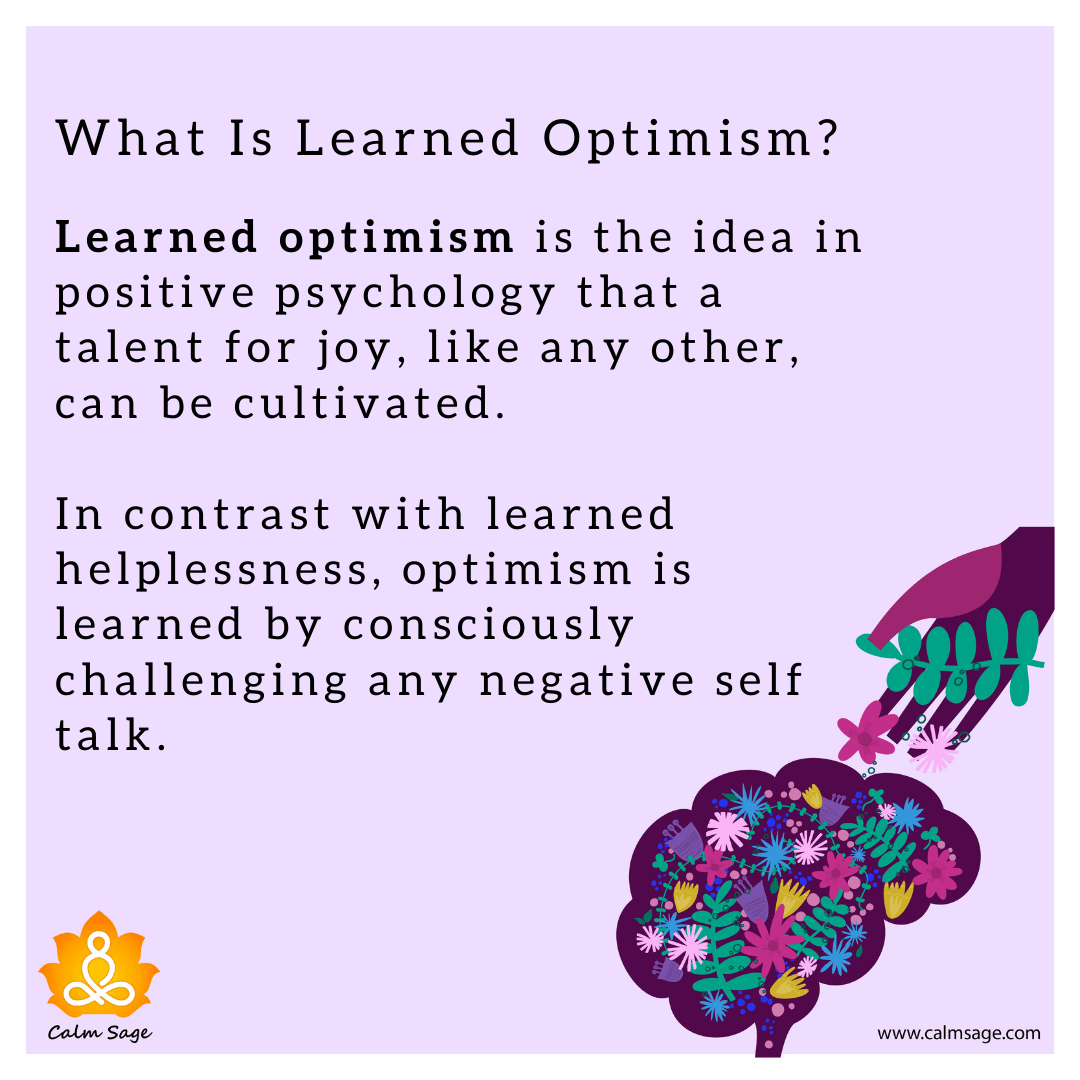Learned Optimism: Martin Seligman’s Way To A Positive Life

Martin Seligman the father of Positive Psychology is always coming up with such beautiful concepts on embracing positivity in our lives. A new concept that has been proposed by him (which is bang opposite of learned helplessness) is Learned Optimism.
According to learned optimism theory, we can learn to cultivate a positive perspective towards ourselves, our lives, and others. Hey, don’t confuse it for toxic positivity, this concept runs on a different line. Let us learn about it in detail.
Psst… Read till the end to find interesting information and exercises for practicing learned optimism in your life.
What Is Learned Optimism?

Before we unfold the essence underlying learned optimism, first let us talk about the concepts of pessimism and optimism.
Pessimist: Anticipating that bad things are going to happen.
Optimism: Anticipating that good and positive things will happen in life.
Which might make you think that learned optimism is all about thinking positively. But if you ask Seligman’s explanatory definition of optimism says,
“The basis of optimism does not lie in positive phrases or images of victory, but in the way you think about causes.”
This habit of changing the way we think about life events can bring in amazing things in our life.
My take on Learned Optimism: Learned optimism is a way to become a more positive seeker in your life. It is all about unlearning habits that pessimism feeds on (like negative self-talk or self-sabotaging) and replacing them by learning optimism-promoting habits (like positive self-talk and self-validation).
Why Practice Learned Optimism?
Alright, I got it that learned optimism is not inhaling and exhaling positive vibes (only) it has a deeper meaning. But, what does it have in store for me?
Now that is an important question to seek an answer for- The benefits of Learned Optimism (trust me there are many). Here are some of the key benefits, backed with science that learned optimism has to offer:
Be motivated. Through learned optimism is linked with higher intrinsic motivation. Basically, you are self-driven to endure stressful circumstances, be goal-focused, and better perform in life.
Excel in your career. Career success, job satisfaction, and high proficiency is linked with people who practice learned optimism (in fact Martin Seligman’s book Learned Optimism has a study on the same).
Boost your health. It has been found that people who have an optimistic outlook also have better cardiovascular health, a strong immune system, and a better approach to deal with health-related issues.
Improve your mental wellness. Along with offering better physical health learned optimism also improves our mental well-being. It is found to reduce the signs of depression and enhance overall well-being.
Live a long life. When compared with pessimism, those who practice optimism are found to live longer, healthier, and happier.
Bid adieu to stress. Learned optimism aids in developing healthy coping mechanisms, which in turn reduces the stress levels experienced by an individual. It enables you to be more resilient and turn the focus on positive changes.
How To Make Learned Optimism A Part of Your Life
Here comes my favorite part, ways to practice learned optimism in your daily life.
1. The “ABCDE” Model
Martin Seligman has suggested the “ABCDE” model of learned optimism. Herein, you have to sit down and ask yourself the following questions to challenge your negative thoughts.
- Adversity: Does the situation calls for a response?
- Belief: How can you interpret this event?
- Consequence: What are the behaviors, responses, and feelings associated with this event?
- Disputation: What examples of events prove your negative beliefs wrong?
- Energization: How can you challenge your negative beliefs and inspire you to move forward?
By using this model to learn to be more optimistic.
2. The P’s to Defeat Cognitive Distortions
Often our negative thoughts are coming from our cognitive distortions. Here is how you can work on your cognitive distortions with the three P’s method:
- Personalization: Are you blaming yourself or those around you for the negative events happening in your life? Time to stop personalising the outcomes of your life and connect it to external factors or circumstances.
- Permanence: Are the thoughts of being stuck in negative life events draining you? Give yourself a reality check that nothing is permanent neither this negative phase nor its impact on your life. Stop seeking them as permanent and unchangeable,, it is momentary, don’t give up yet buddy!
- Pervasiveness: Are you letting one failure of your life decide for the future outcomes of your life? Don’t! Don’t let the one event, mistake, or failure work as a setback in your life. There are a pool of things for you to try and give a shot to, go for it! Take the risk, learn from failures, and be unstoppable.
Books on Learned Optimism and Change Your Life
| Books | Buy on Amazon |
|---|---|
| Learned Optimism by Martin Seligman | Buy Now |
| Everything is going to be OK by Chronicle Books | Buy Now |
| An Optimist’s Tour of the Future | Buy Now |
Videos To Understand Learned Optimism
1. Learned Optimism by Martin Seligman – Animation
2. Learned Optimism Positive Psychology – Martin Seligman – Animated Book Review
3. PNTV: Learned Optimism by Martin Seligman
So when are you planning to challenge your pessimistic thoughts and practice learned optimism in your life?
Do share pessimistic habits that you are currently practicing along with a positive replacement that learned optimism will help you achieve.
I will go first…
I am going to work on my habit of downplaying myself by believing in myself.
Thank you for reading!





















